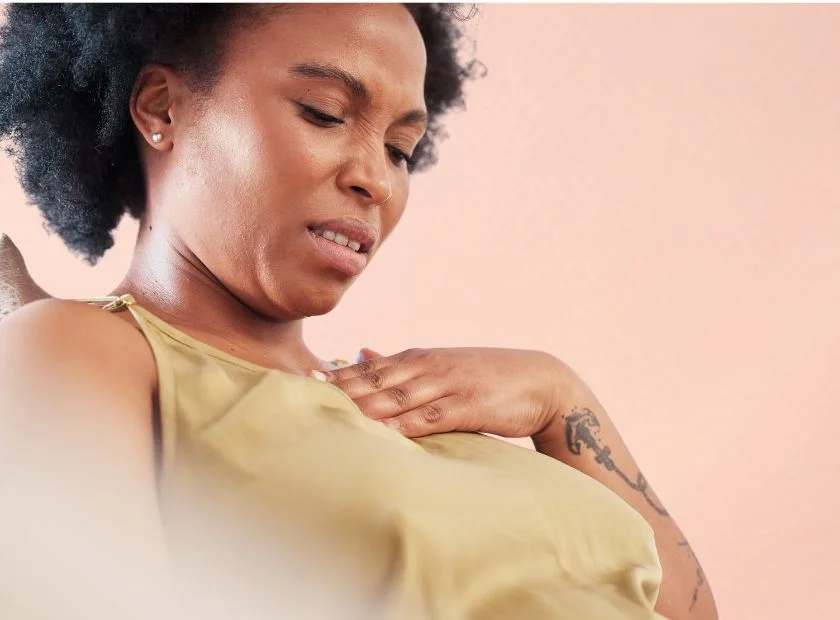Experiencing breast pain, also known as mastalgia, can be uncomfortable and worrisome. It’s like feeling a dull, heavy ache or a sharp, burning sensation in your breasts. This pain, common among women, can come and go in different ways.
Before your period, you might notice mild to moderate pain in both breasts, about two to three days before menstruation starts. During your period, this discomfort may stick around for about a week or even longer, ranging from mild to moderate. But if you’re feeling persistent pain throughout the month, not linked to your menstrual cycle, it’s considered non-cyclical and should be checked out by a doctor. It’s important to know that breast pain is usually not a sign of breast cancer.
Breast pain can be put into different categories
Cyclical Pain
- This type of pain follows your menstrual cycle, showing up about two weeks before your period and easing off during or after menstruation. It often feels like a dull, heavy ache in both breasts, sometimes with swelling.
Non-cyclical Pain
- This pain isn’t tied to your menstrual cycle and can be caused by things like injury to the breast tissue or surrounding areas. It may feel constant, sharp, or burning and often affects just one breast. This type of pain is more common after menopause.
Extramammary Breast Pain
- Sometimes, breast pain isn’t actually coming from the breasts themselves but from nearby areas like chest muscles. This can be managed with rest and anti-inflammatory medication.
A few things can cause breast pain
Breast Size
- Larger breasts can strain muscles in your chest, neck, and shoulders, leading to pain.
Hormone Fluctuations
- Changes in estrogen and progesterone levels, like during puberty, pregnancy, or menopause, can make your breasts swell and feel tender.
Mastitis
- This is an infection of the milk ducts, often seen during breastfeeding and treated with antibiotics.
Diet
- Eating a lot of high-fat and refined carbohydrate foods may increase your chances of breast pain.
Breast Cysts
- As you age, you might develop fibrocystic breast tissue, which can be uncomfortable.
Trauma
- Surgeries or injuries to your breasts can cause pain.
Medications
- Some medications, such as antidepressants, antibiotics, or hormone therapy, can contribute to breast pain.
If your breast pain sticks around or gets worse, it’s important to see a doctor. They might do a clinical breast exam, a mammogram, an ultrasound, or even a biopsy to figure out what’s going on.
Treatment for breast pain depends on what’s causing it
Lifestyle Changes
- Adjusting your diet, cutting back on caffeine, and adding vitamin E, wear a supportive bra might help.
Medications
- Your doctor might prescribe hormone supplements, blockers, anti-inflammatories, or painkillers to ease your symptoms.
Remember, everyone’s experience with breast pain is different, so it’s crucial to talk to a healthcare professional to find the best treatment plan for you.


